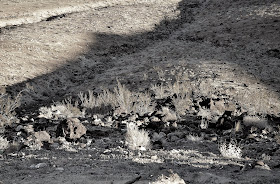Valley
Wells
The 'Trophy
Blue' and 'Moonlight Cream' topped 1951 Chevrolet Bel Air hardtop was a smooth
ride. As the old Fred Hutchinson song states: "The Chevrolet six just
can't be beat." The three speed column shifters got 90 horsepower and the
Powerglide automatics, 105 horses. That infamous 2-speed transmission herded
many of those horses to corrals unknown before reaching the wheels, so the
extra power was necessary. Power being a relative thing. The 'stovebolt six' as
they called it had been around since the '30's and a Ford V-8 could make mince
meat out of a Chevy and whiz by on the old suicide passing lanes. When that happened
dad would recite:
"A guy
Who drives
A car wide open
Is not thinkin'
He's just hopin'
Burma-Shave"
A car wide open
Is not thinkin'
He's just hopin'
Burma-Shave"
The only
hope was to pass an occasional Plymouth
Dad aims
the Chevy back through town to the library where Stacy the librarian gathers
some information for my dad's newly perked interest in landmarks, figuring it
was likely there'd more along our way. And if there might be a short cut
besides the known road north. Stacy said there wasn't but it was funny he
should ask about a short cut for there was a landmark dealing with that very
issue of short cuts just five miles ahead. In fact it was those very people the
landmark talks about, the 'Lost 49'ers' that named Death
Valley . Exciting news for some but at the time I couldn't care
less. I wanted a Coke. Mom agreed and we stop by the market and pick up a six
ounce six pack for thirty seven cents and drop it in the metal Colman cooler.
Dad had taken a mental snapshot of the landmark locations ahead and we were
off, for as always, he felt a man does
not ask directions and does not need a map. What he needs as stated in the
previous dispatch, is a good short cut.
As Stacy
the librarian had noted, we were at our next landmark, 'Valley Wells' in no
time at all. The short story is that in Utah Death Valley in the winter of 1849.
Nice weather but food and water were hard to come by. As they left, one person
wrote down: "As I look back at Death Valley "
....and the name stuck.
They were
getting pretty desperate and the Sierras were looking formidable from where
they stood, so when they spied what we now call Searles Lake California
NO. 443 VALLEY WELLS - In this
area, several groups of midwestern emigrants who had escaped from hazards and
privations in Death Valley in 1849 sought to secure water from Searles Lake Southern California .
Location:Trona Wildrose Rd Valley Wells Rd
Location:






No comments:
Post a Comment